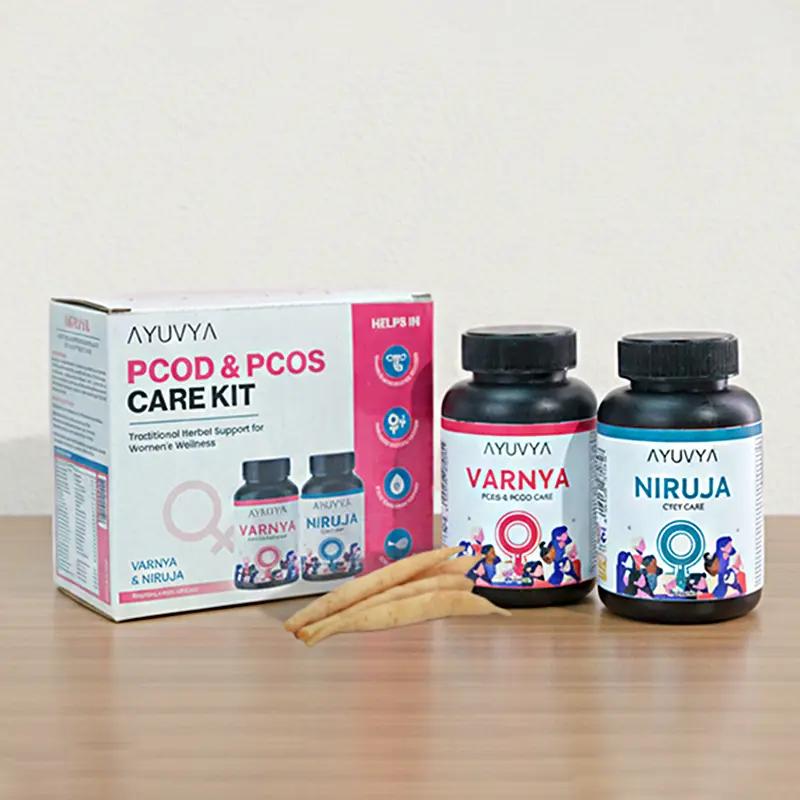PCOS Diet Chart For Effective Weight Management
Apr 22, 2024

If you are suffering from PCOS or PCOD, you need to be very careful with what you eat. It is true; diet is essential in the management of these conditions. A well-designed PCOD PCOS diet plan can control the symptoms by preventing your blood sugar levels from fluctuating and maintaining the balance between your hormones.
Table of Contents:
- Why Diet Matters for PCOS Patients?
- Diet Chart for PCOD Patient
- List of Foods to Avoid with PCOS
- 6 Best Habits for PCOS Patient
- Conclusion
- FAQs
Why Diet Matters for PCOS Patients?
In PCOS, insulin resistance is common, which can lead to high insulin levels in the body. This excess insulin can stimulate the ovaries to produce more androgens (male hormones), which can disturb the normal menstrual cycle and lead to symptoms like irregular periods, acne, etc.
Diet is crucial for managing PCOS because it can directly impact hormone levels, insulin sensitivity, weight management, and inflammation. A diet rich in whole foods, such as vegetables, fruits, whole grains, lean proteins, and healthy fats, can help regulate insulin levels and reduce inflammation, which may improve PCOS symptoms and overall health. Additionally, maintaining a healthy weight through diet and exercise can also help manage PCOS symptoms.
Diet Chart for PCOD Patient
For individuals with PCOD, following a balanced diet is crucial to manage symptoms and improve overall health. Here's a comprehensive diet plan tailored for PCOD patients:
Breakfast
Start with a high-fiber option like oatmeal or whole-grain toast. Add a source of protein such as eggs or Greek yogurt to keep you full and stabilize blood sugar levels.
Include a serving of fresh fruits like berries or an apple for antioxidants and additional fiber.
Mid-Morning Snack
A small handful of nuts (almonds, walnuts) or seeds (flaxseeds, chia seeds) for healthy fats and protein.
A piece of fruit or vegetable sticks with hummus for a fiber boost.
Lunch
A salad with mixed greens, vegetables (cucumbers, bell peppers, carrots), lean protein ( tofu, chickpeas), and a healthy fat source like avocado or olive oil-based dressing.
Alternatively, a whole-grain wrap with cucumbers, lettuce, tomatoes, and mustard can be a good option.
Afternoon Snack
A small serving of whole-grain crackers with low-fat cheese or a fruit smoothie with protein powder and spinach.
Dinner
A bowl of quinoa or brown rice with a side of steamed vegetables (broccoli, asparagus, green beans) and quinoa or brown rice for complex carbohydrates.
For vegetarians, a lentil or bean-based curry with whole-grain roti or rice can be a fulfilling option.
List of Foods to Avoid with PCOS
For PCOS patients, certain foods can exacerbate symptoms and should be limited or avoided in their diet:
Refined Carbohydrates: White bread, pastries, and sweet desserts are examples of foods which can increase blood sugar and insulin levels, thus, worsening PCOS symptoms.
Processed Foods: Fast foods, pre-packaged meals, and snacks are typically full of unhealthy fats, additives, and high sodium levels.
Sugary Beverages: Sodas, energy drinks, and sweetened juices are high in sugar and calories.
High-Glycemic Index Foods: Potato, instant rice, and cornflakes are high glycemic index foods and should be avoided.
Saturated and Trans Fats: High saturated fats (such as red meat and full-fat dairy) and trans fats (found in some baked goods and fried foods) can lead to inflammation.
Alcohol: Alcohol abuse can impair liver function and affect hormone levels, thus, affecting the management of PCOS.
Caffeine: Excessive consumption of caffeine causes hormonal disturbances and must be kept low.
6 Best Habits for PCOS Patient
Managing PCOD/PCOS goes beyond just diet; it encompasses an overall lifestyle approach:
1. Regular Physical Activity
Engage in at least 30 minutes of moderate exercise most days of the week. Activities like brisk walking, cycling, swimming, and yoga can help manage weight, improve insulin sensitivity, and reduce symptoms.
2. Stress Management
Practice stress-reducing techniques such as meditation, deep breathing exercises, and mindfulness to lower stress levels, which can exacerbate PCOD/PCOS symptoms.
3. Weight Management
If you're overweight, losing even a small percentage of your body weight can help regulate your menstrual cycle and improve symptoms. Focus on a balanced diet and regular exercise.
4. Improves Sleep
Aim for 7-9 hours of quality sleep each night. Poor sleep can affect hormones and insulin levels, making PCOD/PCOS symptoms worse.
5. Avoid Toxins
Limit exposure to endocrine-disrupting chemicals found in certain plastics, personal care products, and pesticides. Opt for natural and organic products when possible.
6. Regular Check-ups
Keep up with regular visits to your healthcare provider to monitor your symptoms and adjust your treatment plan as needed.
Final Words
A PCOS diet targets hormonal balance and better ovulation in order to boost fertility. Ayurveda treats PCOS at its root and improves overall health, making it a natural and long-term solution. It is important to consult an experienced practitioner for a personalized treatment plan.
Frequently Asked Questions
Low-glycemic fruits such as berries, cherries, and apples are best for PCOS as they help regulate blood sugar levels and provide essential vitamins and antioxidants.
Yes, women with PCOS can get pregnant. Managing symptoms through lifestyle changes and medical treatment can improve fertility and increase the chances of conception.
While there is no cure for PCOD, it can be effectively managed with lifestyle changes, a proper diet, and medical treatment to alleviate symptoms and prevent complications.
To reduce PCOD naturally, focus on a balanced diet, regular exercise, stress management techniques like yoga and meditation, and maintaining a healthy weight to improve insulin sensitivity and hormonal balance.
An Ayurvedic diet for PCOD focuses on whole foods, high-fiber vegetables, lean proteins, and healthy fats, along with specific herbs like Shatavari and Turmeric to balance hormones and improve menstrual regularity.
Curd, or yogurt, is beneficial for PCOD due to its probiotic content, which can aid digestion and support a healthy gut microbiome, an important factor in managing PCOD.
Eggs are a good option for PCOS as they provide high-quality protein and essential nutrients that support overall health and help in managing symptoms.
Milk can be included in moderation in a PCOD diet, but it's advisable to opt for low-fat or non-dairy alternatives like almond or soy milk to avoid aggravating symptoms.
A balanced diet for PCOD should include high-fiber vegetables, lean proteins like beans, lentils, and chickpeas and tofu, whole grains, healthy fats from avocados and nuts, and low-glycemic fruits such as berries and apples to manage symptoms and support hormonal balance.
In PCOD, it's best to avoid refined carbohydrates, sugary snacks, processed foods, red meat, and high-glycemic index foods, as they can exacerbate symptoms by increasing insulin resistance and inflammation.















